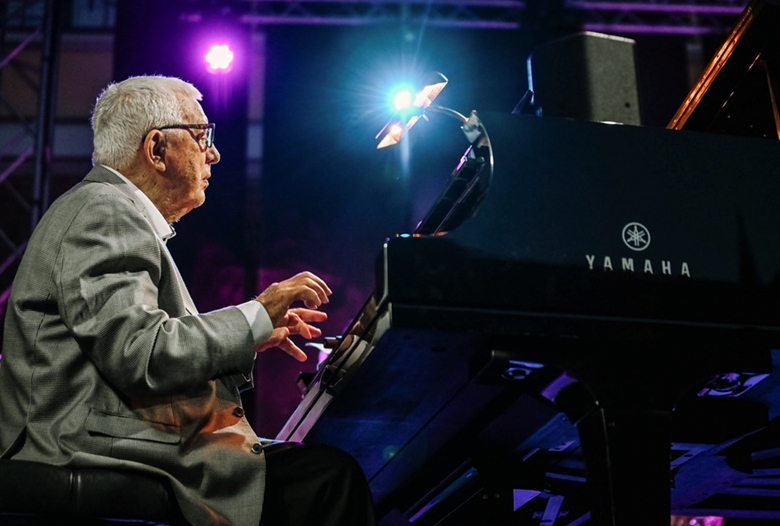From cathedral Sinfonietta lushness to arts-barge improvisation, Rīgas Ritmi excels in garden and on river
Martin Longley
Thursday, July 27, 2023
Martin Longley lands in a Latvia overtaken by summer folk song festival frenzy, as this jazz weekender manages to successfully co-exist…

Latvia’s Rīgas Ritmi festival is essentially divided into a pair of scenes. There’s the mainline outdoor gigs in the Riga Cathedral courtyard, and the more alternative schedule operated by the innovative Jersika Records crew. They are literally a crew, as these gigs happen on Noass, a floating-barge arts centre, tethered to a promontory on the Daugava River. Compared to the fresh-out-of-lockdown 2021 edition (your scribe’s last visit), there are fewer shows in the schedule, which makes their direct time-clashes particularly frustrating. Would it not have been possible to stagger the timings, alternating sets, so that folks could catch all of the bands? Unfortunately, choices had to be made amidst an already sparse programme.
Once a trajectory for ‘Rhythms Of Riga’ was decided, it was possible to ease into a satisfying run of artists. The festival’s subtitle is ‘Impro Jazz Global’, and indeed all of these musical types are covered. Sadly, though, the opening Cathedral night featured somewhat diluted manifestations of Cuban jazz and French blues, courtesy of singer-violinist Yilian Cañizares and singer-mouth harpist Charles Pasi. The most impressive factor with Cañizares is her violin playing, but this tends to play second fiddle to her lead vocals. The set just about hung together as a casual jam session journey, acting as a loose demonstration of what the players could do, bass and percussion meandering, with no shortage of audience interaction. Pasi’s set was simply closer to light rock, or even pop, than the blues, even though the Devil’s music was supposedly his forté.
The Cathedral highlight was a show by the 87-years-old Latvian pianist and composer Raimonds Pauls, famed around the post-Soviet region, and massively important in that musical firmament. Less significant to those of us outside Latvia, Pauls nevertheless impressed as his core jazz trio was surrounded by the Sinfonietta Riga. Even when not familiar with his outpouring of classic pieces, we could bask in the sophisticated arrangements by Callum Au, with many of these Songs Without Words sounding like lush movie soundtrack numbers. In many cases they were indeed taken from film or television sources. Pauls comes across as a dryly witty performer, even without us understanding Latvian, and his frequent piano solos held a minimalist poignancy, like a commingling of Thelonious Monk and Oscar Peterson. A meaningful, strategic simplicity, sometimes one-handed on the keys, as the evening breeze brushed the score-sheets adrift.

The following night offered a complete change of mood and atmosphere on the Noass barge. The Kārlis Auziņš Trio (pictured above) matches the leader’s saxophone with bass and drums, all of them providing muscular input, imbued with a sense of space. A melody is discovered, dissected with grace, the tenor leading into a funkier push. The threesome rapidly increase their level of interaction, as a vamping bass pulse has a tenor solo threaded through its richness, honking, but with quite softened edges. Everyone flies free but there’s an eventual return to a subtly strutting step, with puffball mallets used on the drums, harmonised bowing on the bass strings, and softly spatial fingerings on the horn. Nearing the close, Auziņš chooses soprano, prompting a more mainstream flow.
Meanwhile, the Jersika tape spools are whirring, recording the set for potential future release. This Riga label is resolutely analogue, and only issues vinyl LPs, although we can still stream its records online. In the last few months they’ve moved to a larger studio, increasing the size of bands that they can host. The next afternoon, a posse of writers and radio presenters visited this impressive new joint.
For the festival’s final evening, all performances were on the barge, beginning with M.A.S.A., a quartet supposedly dedicated to free improvisation, although in reality crafting music that was very linear, sounding surely quite premeditated. Assembled by keyboardist Rūdolfs Macats, the band also saw the return of Auziņš, along with singer and electronicist Elīna Silova and drummer Ivars Arutyunyan. Silova sampled her own voice, manipulating into layers, but she often didn't sound sufficiently high in the mix. Perhaps a deliberate request, to be more a part of the general soundscape, rather than a ‘lead vocalist’. Macats looped bass on his keys, and multiple pulses grew, while the voice was sometimes opting for tiny skitters, at others making extended melodic lines. M.A.S.A. preferred an improvised fusion groove, but without any Los Angeles influences, Silova keeping her contribution abstract. Swathes of sonic magnification ballasted the barge.
The Jason Hunter Baltic Quartet totally contrasted, with their organ-groove slickness. Previewing the forthcoming Jersika LP, trumpeter Hunter ran through a breathless sequence of funky hooks, his band concept revolving around the inclusion of players from all three Baltic states: Estonia, Latvia and Lithuania. Except that the Lithuanian drummer couldn’t make it to Riga. The American Hunter has been living in Tallinn for around a decade, and has become an entrenched part of that city’s jazz scene. ‘Parisian Thoroughfare’ was bright, bold, bouncy and brash, with cutting trumpet and alto saxophone solos, building up a hard bop power groove. ‘Good For You’ had the foursome sounding like a big band, with their charging heads, and the following ‘ImagiNation’ was directly inspired by James Brown. The quartet could sometimes rein back into coolness, but most of this set was charged by a precision electricity. A brand new funker climaxed, ‘On The Fly’ unrecorded until now, although those Jersika spools were covertly revolving.


